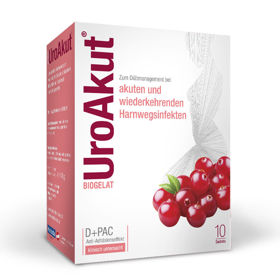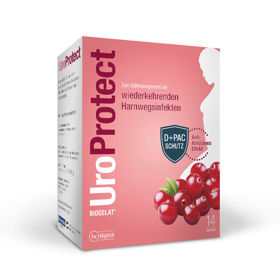Vprašanje stranke:
Kaj je uroinfekt? Vprašanje anonimne stranke
Odgovor farmacevta:
Uroinfekt je medicinski izraz, ki se nanaša na okužbo sečil, stanje, ki ga povzročajo bakterije ali redkeje drugi mikroorganizmi, ki vstopijo v sečilni sistem. Ta sistem vključuje sečnico, mehur, sečevode in ledvice. Okužbe sečil so razmeroma pogoste in se lahko pojavijo pri ljudeh vseh starosti in spolov.
Najpogostejši povzročitelji uroinfektov so bakterije, običajno Escherichia coli (E. coli), ki običajno naseljujejo črevesje. Vzrok za okužbo sečil je običajno vnos teh bakterij v sečnico. To se lahko zgodi predvsem zaradi slabe higiene, spolnega odnosa, nepravilnega brisanja po opravku v stranišču ali zaradi drugih dejavnikov, ki omogočajo bakterijam, da vstopijo v sečilni sistem.
Simptomi prisotnosti uroinfekta se lahko razlikujejo glede na to, kje se nahaja okužba v sečilnem sistemu. Pri vnetju mehurja (cistitis) se pogosto pojavijo simptomi, kot so pekoč občutek med uriniranjem, pogosto uriniranje, nujnost uriniranja, bolečine v spodnjem delu trebuha in moten ali močno dišeč urin. Če se okužba razširi v sečevode ali ledvice, se lahko pojavijo hujši simptomi, vključno z bolečinami v hrbtu, zvišano telesno temperaturo, mrzlico in slabostjo. V nekaterih primerih lahko okužba ledvic (pielonefritis) predstavlja resno zdravstveno grožnjo in zahteva takojšnje zdravljenje.
Diagnoza uroinfekta temelji na zgodovini simptomov, fizičnem pregledu ter analizi urina, vključno z urinsko kulturo, ki omogoča identifikacijo povzročitelja okužbe in določitev njegove občutljivosti na antibiotike. Zdravljenje uroinfekta običajno vključuje antibiotično terapijo, ki je usmerjena proti specifični bakterijski vrsti.
Preventivni ukrepi za zmanjšanje tveganja za uroinfekte vključujejo skrbno osebno higieno, uravnoteženo hidracijo, pravilno izpraznjenje mehurja po uriniranju ter v nekaterih primerih uporabo preventivnega antibiotika pri posameznikih z visokim tveganjem za ponavljajoče se okužbe.
Kako dolgo traja uroinfekt?
Trajanje okužbe sečil je odvisno od več dejavnikov, vključno z vrsto okužbe, resnostjo simptomov, posameznikovim odzivom na zdravljenje ter morebitnimi sočasnimi zdravstvenimi stanji. Okužba sečil se lahko pojavi v različnih delih sečilnega sistema. Na primer, vnetje mehurja (cistitis) običajno ne zahteva dolgotrajnega zdravljenja in se lahko simptomi izboljšajo v nekaj dneh po začetku ustrezne antibiotične terapije. Če pa se okužba razširi v sečevode ali ledvice, lahko trajanje zdravljenja in okrevanja dlje.
Bolj resni simptomi, kot so visoka vročina, hude bolečine v ledvenem predelu, bruhanje ali splošno slabo počutje, običajno zahtevajo bolj agresivno zdravljenje in lahko podaljšajo okrevanje. Pomembno je, da se bolnik odziva na predpisano antibiotično zdravljenje. Če izbrani antibiotik ni učinkovit ali če okužba ostane prisotna, se lahko trajanje okužbe in zdravljenja še podaljša.
Če ima posameznik sočasne zdravstvene težave, kot je diabetes ali prisotnost katetra v mehurju, lahko to vpliva na potek in trajanje uroinfekta. Običajno se blažji primeri okužbe sečil, kot je cistitis, lahko pozdravijo v nekaj dneh po začetku zdravljenja. Vendar pa je pomembno, da bolnik dokonča celotno predpisan potek antibiotične terapije, tudi če se simptomi izboljšajo. To preprečuje ponovitev okužbe ali nastanek odpornosti bakterij na antibiotike.
Pri bolj resnih primerih, kot je pielonefritis (okužba ledvic), lahko zdravljenje traja več tednov, še posebej, če je potrebna bolnišnična oskrba ali intravensko dajanje antibiotikov. V vsakem primeru je priporočljivo, da se posameznik posvetuje s svojim zdravnikom in prejme natančne smernice glede trajanja zdravljenja in okrevanja glede na specifično klinično sliko.
Ali naj se uroinfekt zdraviti z antibiotiki?
Da, uroinfekt se običajno zdravi z antibiotiki. Razlog za to je, da večina uroinfektov povzročajo bakterije, zato je antibakterijsko zdravljenje ključno za odpravo okužbe. Antibiotiki delujejo tako, da uničujejo bakterije ali preprečujejo njihovo rast, kar omogoča telesu, da se znebi okužbe.
Pri zdravljenju uroinfekta se izbira antibiotikov lahko razlikuje glede na vrsto okužbe (npr. cistitis ali pielonefritis), lokalne vzorce odpornosti bakterij in zdravstveno stanje posameznika. Zdravnik bo običajno predpisal antibiotik, ki je učinkovit proti najverjetnejšim povzročiteljem okužbe, ob upoštevanju lokalnih smernic in bakterioloških kultur.
Poleg antibiotikov lahko zdravljenje vključuje tudi splošne ukrepe za lajšanje simptomov, kot so jemanje analgetikov za bolečino ali antipiretikov za zvišano telesno temperaturo. Pomembno je tudi zadostno pitje tekočin, da se urin redči in pomaga izpirati bakterije iz sečilnega sistema.
Pri posameznikih z blago okužbo sečil in asimptomatsko bakteriurijo (prisotnost bakterij v urinu brez simptomov) se lahko v določenih primerih uporabi strategija »čakanja in opazovanja«, še posebej, če okužba ni povezana z visokim tveganjem za zaplete.
Zanimivo branje: Številne bakterije v urinu
Zanimivo branje: Vnetje sečil








 Facebook
Facebook
 Instagram
Instagram
 info@moja-lekarna.com
info@moja-lekarna.com

